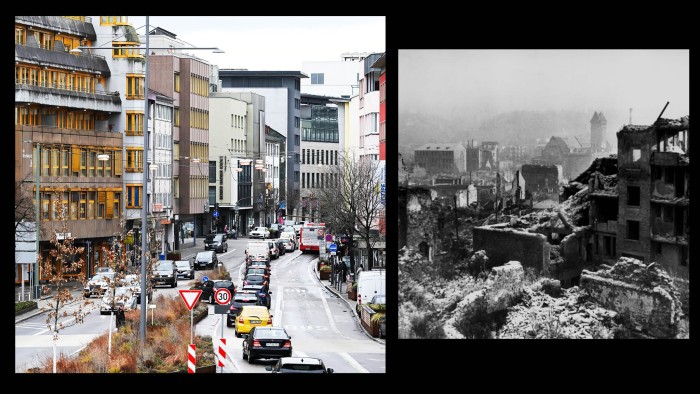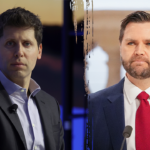Reminders of Germany’s Nazi past are everywhere in the city of Pforzheim.
Small brass “stumble stones” dotted through the streets mark the homes of Jews who were deported and murdered. “Father forgive” implores a banner on the side of a church that commemorates Luftwaffe air raids on the English city of Coventry and British carpet bombing that killed a third of Pforzheim’s population.
No other modern nation has done as much as Germany to confront its history and warn subsequent generations of the dangers of demagogues promising easy solutions and stirring up hate.
And yet, 80 years after the end of the second world war, polling suggests voters on February 23 will award a second-place finish to the Alternative for Germany (AfD), a party that toys with Nazi-era slogans and has called for mass deportations of migrants.

In Pforzheim, a city of 130,000 in the south-western state of Baden-Württemberg, the AfD — which is now targeting a slew of western cities after a series of triumphs in the former communist east — has already enjoyed some of its strongest electoral results anywhere in Germany’s west.
Industrial decline and unusually high levels of migration have pushed voters towards the pro-Russian, anti-EU party, and underlined the limits of Germany’s internationally lauded efforts to overcome its past.
“We in Germany should actually be fairly immune to this rightwing virus,” said Ben Häfner, a high school history teacher in Pforzheim who has watched with alarm as the party has attracted a small but notable minority of his students. “But unfortunately Germany is increasingly infected with it.”
While he, like leading political experts, says the AfD is not the same as Adolf Hitler’s Nazi party, he views it as a grave threat to the “liberal democratic order” enshrined in the postwar constitution.
Pforzheim, nicknamed the “golden city” for its tradition of jewellery and watchmaking, was long a stronghold of Germany’s centre-right Christian Democrats (CDU) — one of the two big-tent “people’s parties” that have led every west German government since 1949.
But as it has grappled with social and economic problems, it has proved fertile ground for the AfD. The party won 23 per cent in European elections in Pforzheim last June. In a local vote the same day, it took control of the city council.


The face of the AfD in Pforzheim is Diana Zimmer, a soft-spoken 26-year-old who leads her party’s local group and is running for the Bundestag.
Zimmer, who focuses mostly on the need to revive Germany’s stagnant economy, seeks to distance the Baden-Württemberg arm of the AfD from the party’s most radical figures.
Still, the regional branch is classified as a suspected rightwing extremist organisation by Germany’s domestic intelligence service. Last month, in the neighbouring city of Karlsruhe, the AfD put “deportation tickets” through letterboxes in areas with large numbers of migrants — a move that Zimmer attempts to play down as a “gimmick”.
History does not feature on the party’s local election leaflets. But Zimmer expresses sympathy with a recent intervention by Elon Musk, the world’s richest man and a newfound AfD cheerleader, who said that there was “too much focus on past guilt” in Germany.
“I think it would be good when we in Germany could sometimes calm down a bit and say: I love Germany, I love my homeland,” she said.
The relationship with the second world war in Pforzheim is complicated by the devastation it suffered, with about 17,600 people killed by the British RAF in a 22-minute bombardment in 1945, even though the city did not have significant heavy industry or munitions plants. “What happened was a war crime — but you’re not allowed to say it,” complained one local AfD official.
The city holds a candlelit vigil to mark the anniversary — which this year coincides with the parliamentary elections. For decades, a torch march has also been held by several dozen neo-Nazis who depict Germans as victims of the second world war. As in previous years, authorities expect a counter-demo by anti-fascist protesters, and several hundred police will attend.


History, though, has weighed less heavily on most voters than more immediate concerns.
Though gold shops still dot the city centre, the jewellery industry has been in decline since the 1980s.
One of today’s critical sectors — the car industry supply chain — is facing huge uncertainty amid an existential crisis in the German auto industry. Recently there has been a jump in short-time work as struggling companies seek to hold on to workers but cut back their hours.
What really makes Pforzheim stand out, though, is its large number of migrants for a city of its size. In the years after Angela Merkel’s famous 2015 decision to open Germany’s borders to those fleeing conflict, it became a refuge for people from Iraq’s Yezidi minority, as well as some Syrians and Ukrainians.
There are also many workers from EU countries, including Romania, Hungary and Poland. Thirty per cent of the population holds a foreign passport and 6.5 per cent are asylum seekers — much higher than the respective national averages of 14.6 per cent and 3.8 per cent.
Joachim Hülsmann, head of the youth and social welfare office in the city, said there were many success stories of families who had become part of the local community.
But the arrivals also put huge pressure on public services. “It was not ‘happy ever after’,” he said. “There were a lot of difficulties.”
Merkel framed the decision to welcome asylum seekers as part of Germany’s historic responsibility to Europe and the world.
But local families — including earlier generations of Turkish and Italian migrants — rarely see it that way. “My three boys can’t find work,” said a 57-year-old woman originally from Turkey, who lives in the rundown Oststadt district. “The refugees get everything for free.”
While Pforzheim was the safest city in Baden-Württemberg in 2023, according to the latest available statistics, police acknowledge that many people do not feel safe. A series of recent fatal attacks by asylum seekers elsewhere in Germany has amplified those fears and come to dominate the national election debate.
The AfD, which wants to lift sanctions on Moscow and resume gas flows from Russia, has found a particularly receptive audience among Pforzheim’s large community of Russian-Germans who fled the Soviet Union. Zimmer, from the AfD, is herself the daughter of Russian émigrés.
“The results speak for themselves,” said Zimmer, pointing to the fact that her party’s vote share had reached as high as 49 per cent in the strongly Russian Buckenberg-Haidach district.


In Pforzheim’s brutalist New Town Hall, parties are at loggerheads over how to deal with the AfD, the largest force on the council — in a microcosm of the arguments playing out on the national stage.
The CDU, the second largest faction on the council, in December submitted a motion to lower property tax that was passed with votes from the far right. Party leader Friedrich Merz last month caused a political furore by taking a similar step, passing a non-binding motion on migration with votes from the AfD — a first in Germany’s postwar parliament.
Andreas Renner, leader of the CDU’s faction on the council, stressed that there were no discussions with the far right before the move. But he said it was a “mistake” by other parties to rule out ever allowing motions to pass with the help of AfD votes, arguing that he must focus on enacting changes that matter to voters.
Yet Annkathrin Wulff, head of the Social Democrat (SPD) group, said there should be no co-operation on the council with the AfD, which was “not a normal” party. She and her SPD believe in tackling the unemployment, inequality and poverty that can make voters feel threatened by migration — but also confronting what they see as AfD fear mongering on the issue.
Polls suggest the AfD will win a nationwide share of the vote of at least 20 per cent. Amid growing jitters among mainstream parties about its ascent, analysts point out that a large majority of German voters still say they will never vote for it. Nor do they want the far right to be included in coalition talks.
But Pforzheim shows how that consensus can come under strain.
Youth workers voice alarm about the AfD’s success in using TikTok to target members of Generation Z, who are more likely to vote for the party than people over 60. It has also harnessed young people’s anger over the lockdowns that caused devastation to their lives during the coronavirus pandemic.
Some in the city have been left wondering whether far-right tendencies can be passed down through generations, since more than 57 per cent of Pforzheimers voted for the Nazi party in 1933.
Julia Bahlke, a youth work leader at the local non-profit organisation SJR, tries to educate young people about the AfD’s actual policies and set the party in the context of German history. But they struggle to make the connection.
“It’s too far away,” she said. “Young people live in the here and now.”
Data visualisation by Martin Stabe and Jonathan Vincent









